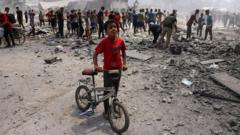Are Gaza City Residents Right to Fear Israel's Takeover Plans?

Understanding the Situation in Gaza City: Voices from the Ground
The recent announcement by the Israeli government regarding its plans to occupy Gaza City has sent shockwaves through the region, leaving its residents in a state of fear and uncertainty. As the Israeli military prepares to take control of this densely populated area, home to around one million people, the humanitarian implications are profound. Local voices are rising, expressing their anguish, resilience, and complex views on the ongoing conflict. This article aims to delve into the sentiments of Gaza City residents, the broader context of the conflict, and the implications of the Israeli occupation plan.
The Facade of Normalcy Amid Crisis
For many residents of Gaza City, life has become an exercise in survival. The daily struggle to secure basic necessities has intensified, as the conflict escalates. Abu Mohammad, a local resident, articulated the anguish felt by many, stating, "We are peaceful civilians. We have nothing to do with what is happening. Netanyahu knows that." His words resonate with the sentiment of countless others who feel trapped in a situation beyond their control.
The Israeli government's assertion that this military operation aims to disarm Hamas and restore security has been met with skepticism. Many residents believe that the pressure is disproportionately placed on them, the innocent civilians, while the leaders of Hamas are safely abroad. This perception fosters a sense of helplessness among the populace, as they grapple with the consequences of decisions made far from their homes.
The Human Cost of Conflict
The human toll of the ongoing conflict is staggering. Over 61,000 people have reportedly lost their lives since the Israeli military began its operations following the Hamas-led attack on southern Israel in October 2023. The loss of life is not just a statistic; it represents a community in mourning, families torn apart, and futures shattered. Dr. Hatem Qanoua, a local physician, expressed the pervasive despair: "We're collapsing across every aspect of life: food, education, healthcare." His words underscore the multifaceted crisis facing residents, as even basic services are strained to breaking point.
Fear of Displacement and the Desire for Stability
As the Israeli military gears up for its planned occupation, the fear of displacement looms large among Gaza City residents. Many remember the trauma of previous evacuations and the harsh realities of temporary shelters. Sabrine Mahmoud's defiant statement, "I will not leave my house," reflects a collective resistance to the threats of displacement. Her sentiment is echoed by others who have experienced the humiliation of being uprooted from their homes.
- Temporary shelters: Many residents are currently staying in makeshift accommodations, fearing that they may be forced to leave these as well.
- Emotional trauma: The memories of past displacements continue to haunt residents, making them wary of any calls to evacuate.
- Community resilience: Despite the fear, there is a strong sense of community among residents, who support each other through these trying times.
The Role of External Influences
The plight of Gaza's residents has not gone unnoticed by the international community. Human rights advocates, including UN officials, have condemned the Israeli plans, warning that they could lead to "more massive forced displacement" and "atrocity crimes." The voices of the international community often clash with the local sentiments, as residents feel their suffering is largely overlooked.
Local resident Um Ahmad Shalah’s plea for help from Arab countries and global leaders encapsulates the desperation felt by many: "We want the Arab countries, Trump, and all other nations to have mercy on us and stand with us." This call for solidarity underscores the isolation that many Gazans feel, as they navigate a complex web of geopolitical interests that often prioritize power dynamics over humanitarian concerns.
Frustration with Hamas
Interestingly, while many residents express fear and frustration towards the Israeli government, there is also a palpable anger directed at Hamas. Some citizens blame the militant group for the ongoing violence and the dire humanitarian situation. Ehab al-Helou, a social media influencer from Gaza City, voiced a sentiment shared by many: "Hamas leaders are living in a science fiction world. Have mercy on the people." This frustration is indicative of a growing discontent within the population regarding their leadership and its handling of the crisis.
Key Points of Frustration with Hamas:
- Failure to negotiate: Some residents believe that Hamas has not done enough to seek a peaceful resolution to the conflict.
- Leadership disconnect: Many feel that Hamas leaders are disconnected from the realities faced by ordinary civilians.
- Public safety concerns: The actions of Hamas have, in the eyes of some, jeopardized the safety and security of the population.
The Psychological Impact of Ongoing Conflict
Living under the constant threat of violence takes a significant toll on the mental health of Gaza's residents. Fear, anxiety, and despair permeate daily life, affecting everyone, especially children who have grown up knowing nothing but conflict. Dr. Hatem Qanoua's poignant reflection on the future of the children in Gaza highlights the emotional scars that will persist long after the conflict has ended.
The psychological impact extends beyond individual suffering; it affects the community's fabric. Schools, once places of learning, have become sites of trauma, and healthcare systems are struggling to cope with both physical and mental health crises. The urgent need for mental health support in Gaza cannot be overstated, as residents grapple with the aftermath of violence and loss.
International Response and Humanitarian Aid
Despite the dire situation, international responses vary widely. Humanitarian aid organizations are attempting to provide relief, but access remains a significant challenge. Blockades and military operations complicate efforts to deliver essential supplies, and many residents find themselves in desperate need of food, medical care, and psychological support.
The role of international organizations is crucial in addressing the humanitarian crisis. However, residents often express frustration with the perceived ineffectiveness of these efforts. As Abu Mustafa noted, "Israel has turned evacuation into a game," highlighting the lack of genuine concern for civilian lives amid ongoing hostilities.
Hope Amid Despair: The Resilience of Gaza City Residents
Despite the overwhelming challenges, the spirit of resilience among Gaza City residents shines through. Many individuals are determined to support one another and maintain a sense of normalcy in their lives, even amidst chaos. This community solidarity is essential for survival and offers a glimmer of hope for a better future.
Local initiatives aimed at providing support, whether through food distribution or mental health awareness, demonstrate the strength of the human spirit. In times of crisis, the ability to come together and uplift one another becomes vital for coping with the trauma and uncertainty that define life in Gaza.
Conclusion: A Call for Awareness and Action
The situation in Gaza City is a poignant reminder of the complexities of conflict and the human cost that comes with it. As the world watches, it is imperative to recognize the voices of those most affected— the residents who endure hardship and fear. Their stories call for compassion, understanding, and action from the international community.
As we reflect on the experiences of Gaza's residents, we are prompted to consider our role in advocating for peace and supporting humanitarian efforts. How can we contribute to a future where the voices of civilians are prioritized, and their suffering is alleviated? In a world where conflict often overshadows compassion, the need for awareness and action has never been more urgent.
Frequently Asked Questions
What are the main concerns of Gaza City residents regarding the Israeli occupation plan?
Residents are primarily concerned about the fear of displacement from their homes, the ongoing violence, and the humanitarian crisis that has impacted their access to basic necessities such as food, healthcare, and education.
What is the impact of the conflict on children in Gaza City?
Children in Gaza have grown up in an environment of conflict, resulting in significant psychological trauma. Their education and mental health have been severely affected, with many experiencing fear and anxiety.
How does the international community respond to the situation in Gaza City?
The international community's response includes humanitarian aid efforts, though access remains a challenge due to ongoing military operations and blockades. Many residents feel that these efforts are insufficient to address the scale of the crisis.
As we consider the complex realities facing Gaza City, we must ask ourselves: What can we do to support the resilience of communities in conflict zones? #GazaVoices #HumanRights #PeaceBuilding
Published: 2025-08-08 14:35:31 | Category: technology



